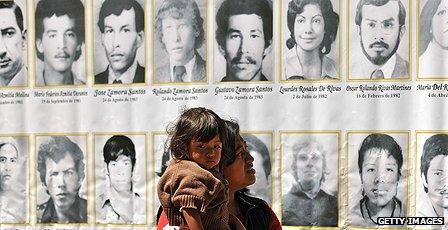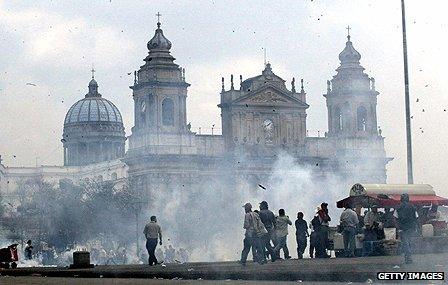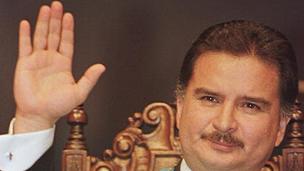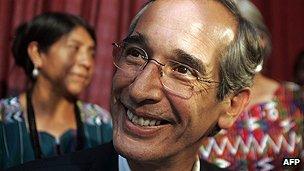Guatemala profile - Timeline
- Published
A chronology of key events:
1523-24 - Spanish adventurer Pedro de Alvarado defeats the indigenous Maya and turns Guatemala into a Spanish colony.

More than 200,000 were killed or disappeared in the 36-year civil war which ended in 1996
1821 - Guatemala becomes independent and joins the Mexican empire the following year.
1823 - Guatemala becomes part of the United Provinces of Central America, which also include Costa Rica, El Salvador, Honduras and Nicaragua.
1839 - Guatemala becomes fully independent.
1844-65 - Guatemala ruled by conservative dictator Rafael Carrera.
1873-85 - Guatemala ruled by liberal President Justo Rufino Barrios, who modernises the country, develops the army and introduces coffee growing.
1931 - Jorge Ubico becomes president; his tenure is marked by repressive rule and then by an improvement in the country's finances.
1941 - Guatemala declares war on the Axis powers.
Social-democratic reforms
1944 - Juan Jose Arevalo becomes president following the overthrow of Ubico and introduces social-democratic reforms, including setting up a social security system and redistributing land to landless peasants.
1951 - Colonel Jacobo Arbenz Guzman becomes president, continuing Arevalo's reforms.
1954 - Land reform stops with the accession to power of Colonel Carlos Castillo in a coup backed by the US and prompted by Arbenz's nationalisation of plantations of the United Fruit Company.
1960-1996 - Civil war pitting government against leftist rebels supported mainly by indigenous people.
1963 - Colonel Enrique Peralta becomes president following the assassination of Castillo.
1966 - Civilian rule restored; Cesar Mendez elected president.
1970 - Military-backed Carlos Arena elected president.
Human rights violated
1970s - Military rulers embark on a programme to eliminate left-wingers, resulting in at least 50,000 deaths.
1976 - 27,000 people are killed and more than a million rendered homeless by earthquake.
1980 January - Spanish embassy fire, a defining event in the civil war, in which 36 people die after police raid the embassy occupied by peasants.
1981 - Around 11,000 people are killed by death squads and soldiers in response to growing anti-government guerrilla activity.
1982 - General Efrain Rios Montt takes power in a military coup. He conducts a campaign of mass murder against indigenous Mayans, accusing them of harbouring insurgents. He faces trial over these crimes in 2013.
1983 - Montt ousted in coup led by General Mejia Victores, who declares an amnesty for guerrillas.
1985 - Marco Vinicio Cerezo Arevalo elected president and the Guatemalan Christian Democratic Party wins legislative elections under a new constitution.
1989 - Attempt to overthrow Cerezo fails; civil war toll since 1980 reaches 100,000 dead and 40,000 missing.
1991 - Jorge Serrano Elias elected president. Diplomatic relations restored with Belize, from whom Guatemala had long-standing territorial claims.
1993 - Serrano forced to resign after his attempt to impose an authoritarian regime ignites a wave of protests; Ramiro de Leon Carpio elected president by the legislature.
1994 - Peace talks between the government and rebels of the Guatemalan Revolutionary National Unity begin; right-wing parties win a majority in legislative elections.
1995 - Rebels declare a ceasefire; UN and US criticise Guatemala for widespread human rights abuses.
End of civil war
1996 - Alvaro Arzu is elected president, conducts a purge of senior military officers and signs a peace agreement with rebels, ending 36 years of civil war.
1998 - Bishop Juan Gerardi, a human rights campaigner, murdered.
1999 - UN-backed commission says security forces were behind 93% of all human rights atrocities committed during the civil war, which claimed 200,000 lives, and that senior officials had overseen 626 massacres in Maya villages.
2000 - Alfonso Portillo sworn in as president after winning elections in 1999.
2001 December - President Portillo pays $1.8m in compensation to the families of 226 men, women and children killed by soldiers and paramilitaries in the northern village of Las Dos Erres in 1982.
Border talks
2002 September - Guatemala and Belize agree on draft settlement to their long-standing border dispute at talks brokered by Organization of American States (OAS). Both nations will hold referendums on draft settlement.
2003 November - Presidential elections go to second round. Former military leader Efrain Rios Montt, trailing in third place, accepts defeat.

Tear gas shot by riot police hangs over Guatemala City where protesters marched against the free trade agreement with the US
2003 December - Conservative businessman Oscar Berger - a former mayor of Guatemala City - wins the presidential election in the second round.
Guatemala - along with Nicaragua, El Salvador and Honduras - agrees on a free-trade agreement with the US.
2004 May - Former military leader Efrain Rios Montt is placed under house arrest.
2004 May/June - Major cuts to the army; bases are closed and 10,000 soldiers are retired.
2004 July - $3.5 million in damages paid to victims of civil war. Move follows state's formal admissions of guilt in several well-known human rights crimes.
2004 December - UN mission, set up to monitor post-civil war peace process, winds up, but the UN says Guatemala still suffers from crime, social injustice, human rights violations.
2005 March - Government ratifies Central American free trade deal with US amid street protests in capital.
2005 November - Guatemala's leading anti-drugs investigator is arrested in the US on charges of drug trafficking.
2006 July - A Spanish judge issues a warrant for the arrest of former military leader Efrain Rios Montt and other former officials over atrocities committed during the civil war.
2006 December - The government and the UN agree to create a commission - to be known as the CICIG - to identify and dismantle powerful clandestine armed groups.
2007 May - Guatemala ratifies an international adoption treaty, committing it to ensure that babies are not bought or stolen.
Murders
2007 July - Amnesty International urges the government to ratify the CICIG as a first step towards tackling the culture of impunity it says has contributed to Guatemala's soaring murder rate.
2007 August - International election monitors say they are worried about the high murder rate among political candidates and activists in the run-up to the 9 September polls.
2007 November - Alvaro Colom of centre-left National Unity of Hope Party wins presidential elections with nearly 53 percent of the vote.

Ex-president Portillo was extradited from Mexico but cleared of embezzlement charges
2008 October - Ex-President Alfonso Portillo is extradited from Mexico to face corruption charges. A court later clears him.
2009 May - President Colom denies involvement in murder of a prominent lawyer who in a video made before to his death claimed Colom and others were out to kill him. A UN probe clears Mr Colom.
Trials
2009 September - An ex-paramilitary officer, Felipe Cusanero, becomes the first person to be jailed for the forced disappearance of civilians in Guatemala's civil war.
2009 December - Retired colonel becomes first army officer to be convicted of crimes committed during civil war.

Alvaro Colom was president from 2007 until 2011
2010 March - Country's police chief and anti-drugs tsar are sacked over the theft of cocaine.
2010 October - US apologises for deliberately infecting hundreds of Guatemalans with gonorrhoea and syphilis as part of medical tests in the 1940s.
2011 August - Four former soldiers found guilty of a village massacre become the first to be convicted of rights abuses during the civil war.
2011 November - Former army general Otto Perez Molina of the right-wing Patriotic Party wins presidential elections, takes office in January.
2011 December - President Colom apologises to the relatives of the more than 200 victims of the 1982 massacre in the village of Dos Erres during the civil war.
2012 March - President Perez Molina proposes decriminalising drugs as a way of combating the illegal narcotics trade.
2013 May - Ex-military leader Efrain Rios Montt is convicted of genocide and crimes against humanity, only to have the ruling overturned by the constitutional court on a technicality, forcing a retrial, although no date is set.
2014 March - Ex-President Alfonso Portillo pleads guilty in a US court to charges that he accepted $2.5m (£1.5m) in bribes from Taiwan in return for a promise of continued recognition by Guatemala.
2014 June - The US to give millions of dollars of aid to Guatemala, El Salvador, and Honduras to combat gang violence and help citizens repatriated from the US, as part of efforts to cope with growing migration.
2014 August - Armed forces chief Rudy Ortiz dies in a helicopter crash of unknown cause in bad weather near the border with Mexico.
2015 January - The retrial on genocide charges of Guatemala's ex-military ruler General Efrain Rios Montt is suspended, after his lawyers question the impartiality of the lead judge.
2015 August - A court rules that ex-military ruler General Efrain Rios Montt must face a retrial for genocide in January despite suffering from dementia, but he will not be tried in person or be sentenced if found guilty.
President Perez Molina resigns after Congress lifts his immunity in response to allegations by prosecutors of his involvement in a customs bribery ring.
2015 October - Jimmy Morales wins presidential election.
2016 November - El Salvador, Guatemala and Honduras announce a joint security force aimed at fighting gangs and cross-border organised crime.
2017 August - President Morales orders the expulsion of the head of the UN anti-corruption mission which backed calls by prosecutors for the removal of his political immunity.
2018 April - Guatemalans vote in a referendum in favour of referring a two-centuries-old border dispute with what is now Belize to the International Court of Justice.
2018 May - Guatemala becomes the second country after the US to move its embassy in Israel to Jerusalem.
Migration troubles
2019 July - The US and Guatemala sign a migration agreement, to require migrants from El Salvador and Honduras who pass through Guatemala to seek asylum there first. The US had threatened Guatemala with tariffs if it did not comply.
2020 January - Conservative candidate Alejandro Giammettei takes office afer defeating his centre-left rival Sally Torres.
2020 November - Protestors burn the Congress building after clashes with police, following public anger at a budget that opponents say neglects poverty.